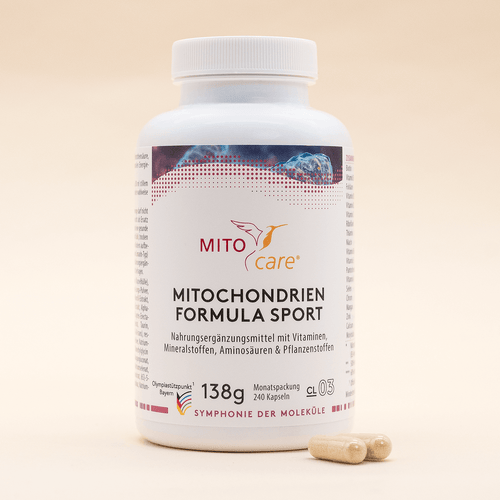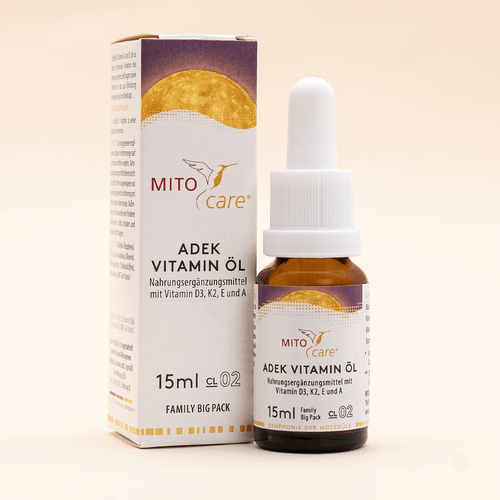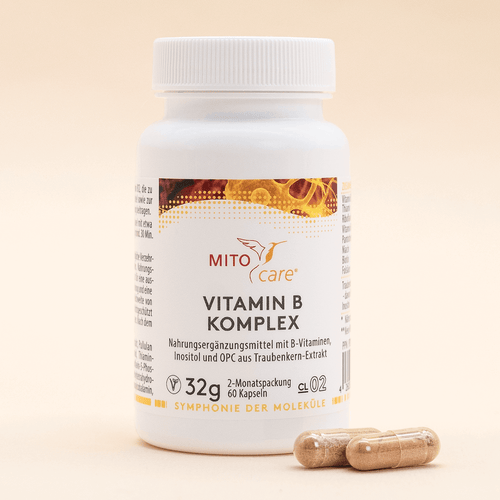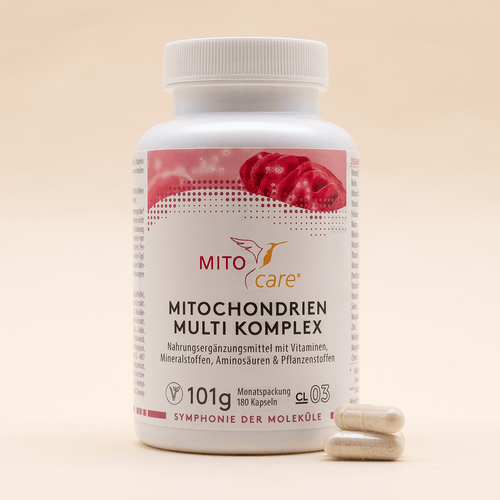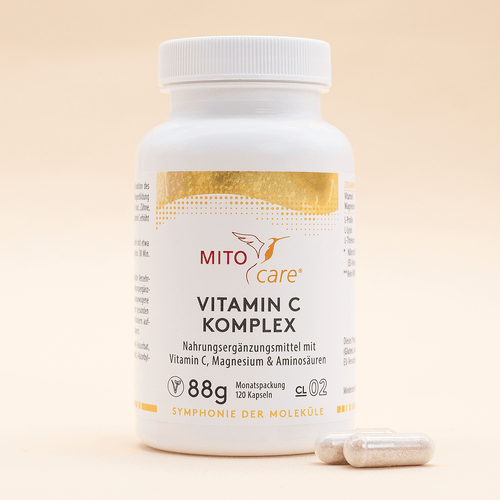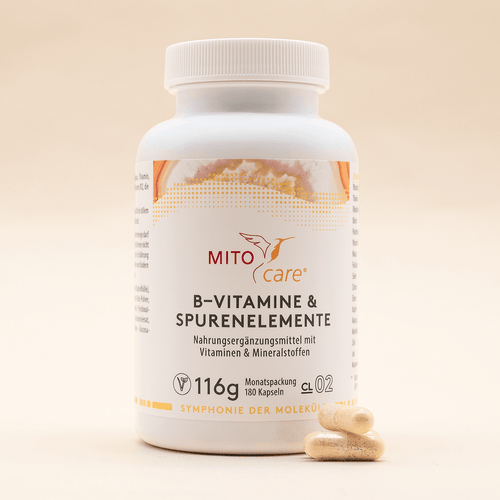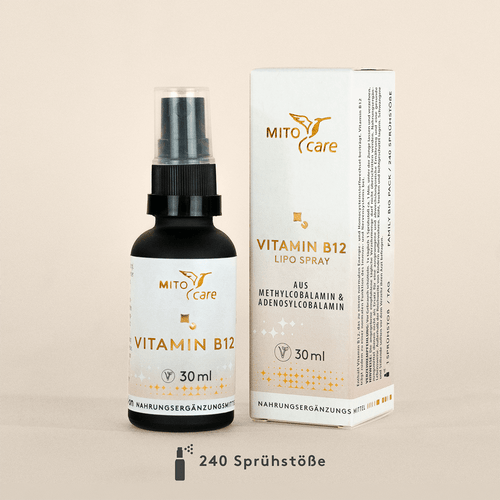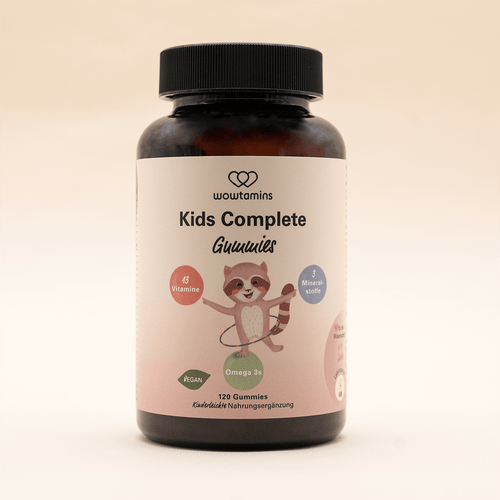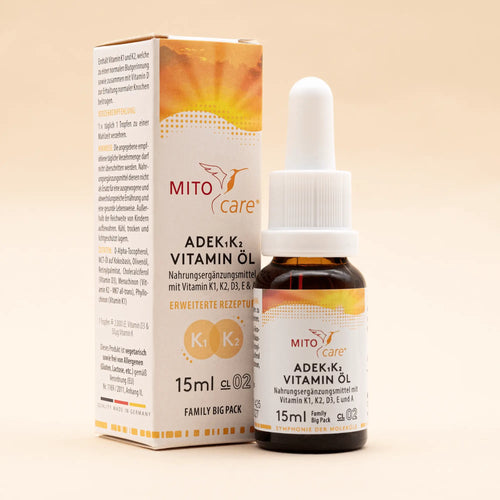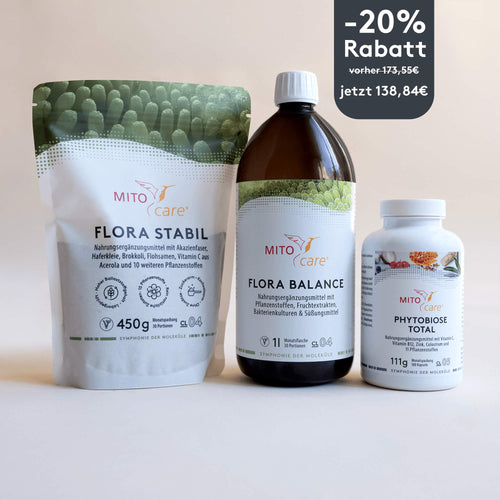Themen dieses Blogartikels:
Introduction
What are the functions of water-soluble vitamins? - Vitamins part 2
You can find out here in part 2 on vitamins.
Knowledge for your ears!
No time to read? Here you can listen to Claire's article.
Table of Contents
• Vitamin C (ascorbic acid)
• Vitamin B1 (thiamine)
• Vitamin B2 (riboflavin)
• Vitamin B3 (niacin)
• Vitamin B5 (pantothenic acid)
• Vitamin B6 (pyridoxine)
• Vitamin B7 (biotin)
• Vitamin B9 (folic acid)
• Vitamin B12 (cobalamin)
• Bibliography
What are water-soluble vitamins?
The group of water-soluble vitamins includes vitamin C and the B vitamins. With the water-soluble vitamins, there is hardly any danger of overdosing, since they are simply excreted in the urine if the intake is too high.
Vitamin C (ascorbic acid)
What are the functions of vitamin C in the body?
Vitamin C is important for:
• Formation of connective tissue and collagen formation
• Blood vessels, skin, gums and teeth
• Wound healing
• Protection from free radicals and regeneration of vitamin E
• Strengthening of the immune system (also after physical stress)
• Cell protection from premature aging processes
• Cell metabolism
• Iron absorption
• Formation of messenger substances, hormones and sperms
• Energy balance
• A healthy psyche
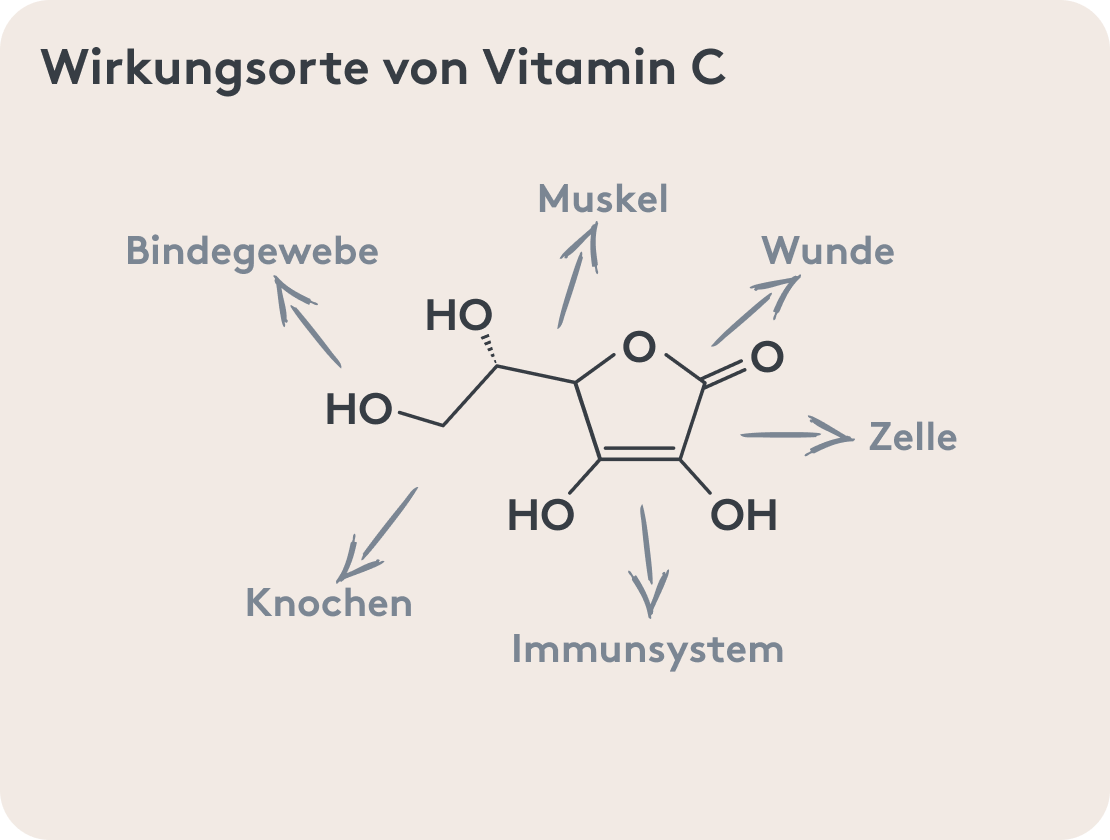
How does a vitamin C deficiency manifest itself?
A vitamin C deficiency can lead to:
• Bleeding gums and tooth loss
• Joint and bone pain and joint inflammation
• Tiredness, exhaustion and dizziness
• Depression
• Diarrhea
• Heart failure
• Susceptibility to infection
Vitamin C is found in sea buckthorn, citrus fruits, rose hips, black currants, bell peppers, kale and Brussels sprouts, strawberries, and potatoes. The daily requirement is 90-110 mg, which corresponds to approximately 60 g of black currants, 80 g of bell peppers, or even 200 g of citrus fruits. This means that bell peppers contain significantly more vitamin C than the more commonly known citrus fruits.
Vitamin B1 (thiamine)
What does thiamine do in the body and what happens with a B1 deficiency?
Vitamin B1, also called thiamine, is important for:
• The energy metabolism
• The cell metabolism
• Stimulus transmission in the nervous system
• Glucose metabolism and metabolism of amino acids
• Energy production from food
A vitamin B1 deficiency can lead to:
• Fatigue, irritability and loss of appetite
• Memory problems, headaches and lack of concentration
• Depressed mood or depression
• Decreasing physical performance
Vitamin B1 is found in whole grain products, pork, nuts, seeds and legumes. The daily requirement is at least 1 mg.
Vitamin B2 (riboflavin)
Functions of vitamin B2 and deficiency symptoms
Vitamin B2 is important for:
• The energy metabolism
• Skin and mucous membranes
• Growth and development
• The nervous system
• The maintenance of red blood cells and normal iron metabolism
• Vision
• The protection against oxidative stress
A vitamin B2 deficiency can lead to:
• Cracked skin and torn corners of the mouth
• Skin inflammation and changes, increased desquamation of the skin
• Light sensitivity
• Anemia
Vitamin B2 is found in dairy products, eggs, soy, fish, whole grains, nuts, mushrooms, legumes, broccoli, kale and spinach. The daily requirement is 1.2 to 1.5 mg and can be found in a large portion of whole-grain pasta with spinach, mushrooms or broccoli, sprinkled with nuts or cheese.
Vitamin B3 (niacin)
Vitamin B3 is involved in reactions of:
• Energy metabolism
• Nervous system
• Psyche
• Skin and mucous membranes
What does a niacin deficiency look like?
A vitamin B3 deficiency can lead to:
• Inflamed and altered mucous membranes and skin lesions
• Physical weakness
• Mental impairment
Vitamin B3 is found, for example, in nuts, sea fish, whole grain products, lean meat, dairy products, eggs, legumes, dates and mushrooms. The daily requirement is 11 to 13 mg. Nowadays, niacin is found as nicotinamide in many skin creams and beverages.
Vitamin B5 (pantothenic acid)
Why do we need vitamin B5?
Vitamin B5 is important for:
• Energy metabolism
• Hormone production (steroid hormones, vitamin D)
• Formation of some neurotransmitters
• The mental performance
A vitamin B5 deficiency can lead to:
• Insomnia and fatigue
• Muscle pain
• Hormonal disorders
• Imbalance and concentration problems
Vitamin B5 is found in yeast, egg yolk, whole grain products, liver and offal, dairy products, fish, nuts and legumes. The daily requirement is 6 mg.
Vitamin B6 (pyridoxine)
Vitamin B6, also called pyridoxine, is important for:
• Energy metabolism
• Protein and glucose storage metabolism
• Blood formation
• Hormone regulation
• Nervous system and psyche
• Immune system
• The cysteine formation
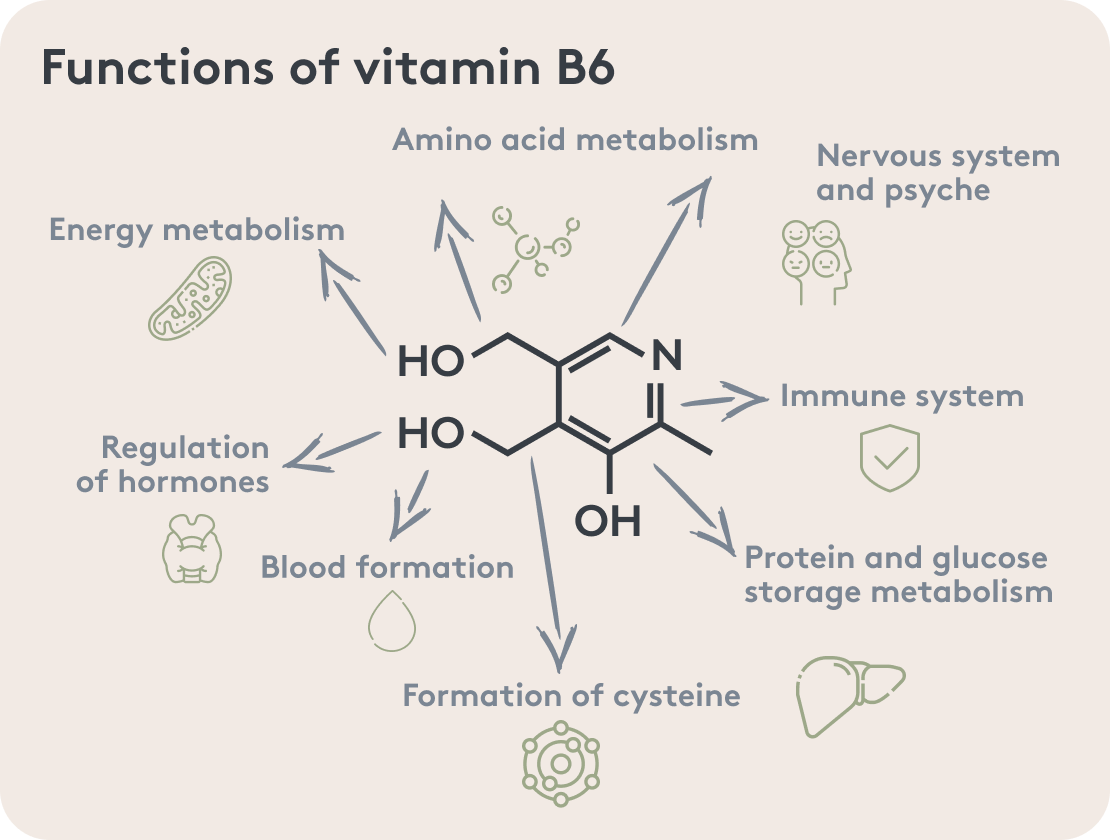

• Sleep and anxiety disorders
• Developmental disorders in children
• Anemia
• Muscle twitching and disturbed motor activity/movement sequences
Vitamin B6 is found in offal, fatty fish, whole grain products, nuts and seeds, bananas and potatoes. The daily requirement is 1.4-1.6 mg. The ideal form in dietary supplements is a phosphorylated form, i.e. as pyridoxal phosphate.
Vitamin B7 (biotin)
Why is biotin important?
Vitamin B7, also called biotin, is important for:
• Skin, hair, nails and mucous membranes
• Protein and carbohydrate metabolism
• Energy metabolism
• Nerves and psyche
Vitamin B7 deficiency can lead to:
• Brittle nails, hair loss, skin disorders
• Loss of appetite and nausea
• Poor wound healing
• Muscle pain
Vitamin B7 is found, for example, in offal, egg yolk, oatmeal, peanuts, spinach, mushrooms, lentils and many other foods in very small doses. The daily requirement is 30 to 60 µg.
Vitamin B9 (folic acid)
Functions of folic acid
Vitamin B9, also called folic acid, is important for:
• New formation of cells
• Nervous system and psyche
• Blood formation
• Homocysteine and methyl metabolism
• Neural tube formation (this is the creation of the later central nervous system) of the fetus
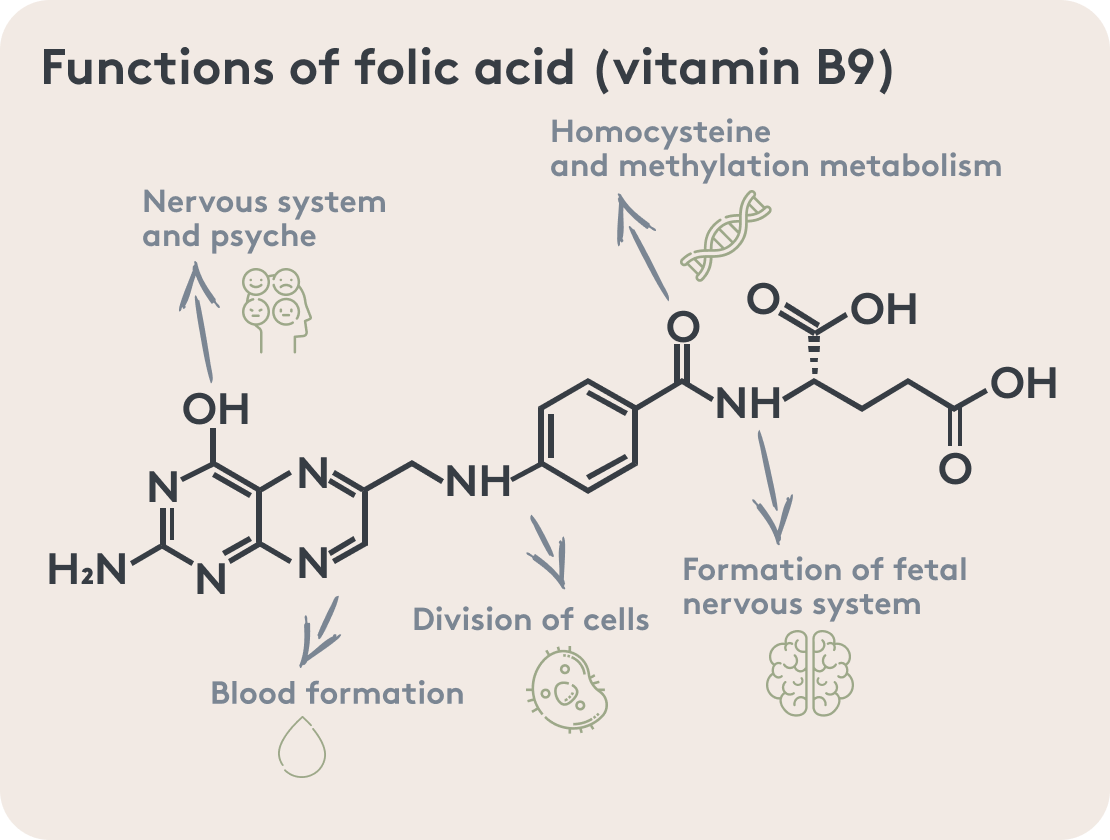

• Malformations in unborn children and increased risk of premature birth and congenital heart defects
• Delayed speech development of the child
• Mental impairment
Vitamin B9 is found in leafy and cabbage vegetables, whole grains, liver, whole cereals, eggs, legumes, tomatoes and potatoes. The daily requirement is 300 µg. In the case of food supplements, care should be taken to ensure that vitamin B9 is contained in the methylated form, i.e. as methylfolate. Otherwise, the body must expend additional energy and substances to activate the folic acid.
Vitamin B12 (cobalamin)
Vitamin B12 also has antioxidant properties and can reduce homocysteine levels in the body. Elevated homocysteine correlates with various diseases such as Alzheimer's disease and venous thrombosis. In addition, it speaks to a problematic methyl metabolism. This can be addressed with the physician or therapist.
Vitamin B12 is often seen as a critical factor in a vegan or vegetarian diet. However, supplementation can be useful in general, since eating offal is no longer so popular and vitamin B12 is mainly found in it.
What do you need vitamin B12 for and what happens when you have a B12 deficiency?
Vitamin B12, also called cobalamin, is important for:
• Red blood cell formation
• A functioning nervous system and the psyche
• Cell division
• Energy metabolism
• Homocysteine and methyl metabolism
Vitamin B12 deficiency can lead to:
• Psychological upsets
• Dementia, concentration difficulties, reduced memory capacity
• Irritability, mood swings
• Fatigue and pallor
• Anemia
• Tingling or numbness in fingers or toes
Vitamin B12 is found in meat, fish, eggs, dairy products and offal. The daily requirement is 4 µg. Vitamin B12 is largely produced by bacteria, some of which we can also find in our intestines. The high content of vitamin B12 in animal foods is due to its production by bacteria.
Supplement B vitamins - but how?

Did you miss part 1?
Bibliography
2 Chen, A. C., Damian, D. L. (2014). Nicotinamide and the skin. The Australasian journal of dermatology, 55(3), 169–175. https://doi.org/10.1111/ajd.12163
3 Rodriguez-Melendez, R., & Zempleni, J. (2003). Regulation of gene expression by biotin (review). The Journal of nutritional biochemistry, 14(12), 680–690. https://doi.org/10.1016/j.jnutbio.2003.07.001


